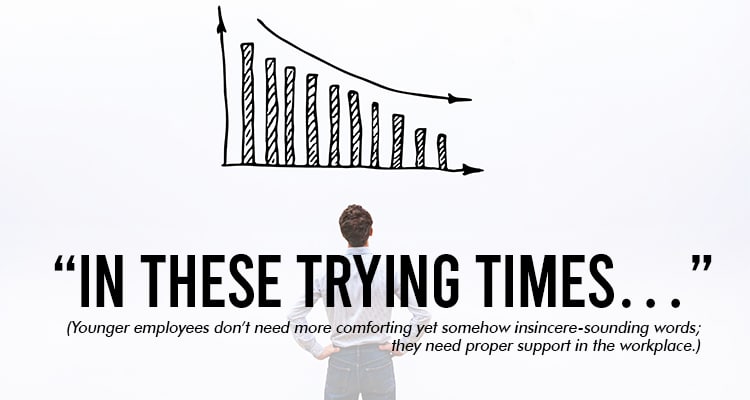Effective workplace communication is one of the most crucial aspects of a well-oiled workplace. Especially now that most of us are working via online jobs and communicating via Zoom or Skype.
Being on the same page with your co-workers also decreases the likelihood of errors in the workplace and helps improve overall morale.
However, there are many challenges to effective workplace communication. And one of the most common ones is the differences in language between older employees and millennials and gen z employees.
Older employees can sometimes use unfamiliar corporate jargon with younger employees, which can result in misunderstandings between them.
That said, there are also plenty of gen z and millennial terms and phrases which are unfamiliar and irritating to older employees. After all, being reminded of one’s age isn’t fun, right?
To help avoid these issues, here are some corporate jargon you should avoid when communicating with millennials or gen z co-workers.

“One Big Happy Family.”
One of the most annoying corporate buzzwords for many millennials and gen z employees is “one big happy family.” After all, families don’t lay off their members during economic downturns or a poor business quarter.
In addition, millennials and gen z employees, especially those working remotely, aren’t all that attached to their workplace -and rightly so. For them, it’s just a place to earn money and grow their careers.
Unlike previous generations, who achieved job stability with one or two jobs, millennials and Gen Z can’t do that anymore. This is due to the various economic issues facing the country today.
Thus, younger employees aren’t likely to stick to one company their entire career and would seek better opportunities elsewhere. And they consider it a red flag when companies use this corporate jargon too.

“Low-Hanging Fruit.”
Another unpopular corporate jargon you should avoid using around your millennials and/or gen z co-workers is “low-hanging fruit.” This is an agricultural metaphor used to describe opportunities or solutions that are easy to acquire.
However, younger employees often don’t appreciate this metaphor. Not because they don’t know it; but because they prefer their older co-workers to get to the point.
And if you think about it, going after “low-hanging fruit” constantly will cause companies to miss out on better long-term opportunities. Because instead of carrying out the appropriate long-term solution for a problem, you end up opting for a quick band-aid solution.

“In These Trying Times…”
We get it. You’re trying to show sympathy to your younger co-workers/employees during times of uncertainty. But it’s been three years since Covid struck, and that’s still the only thing you can say?
Yes, it seems nice to hear, but when everyone from the smallest businesses to the largest corporations says it, it comes off as disingenuous. Younger employees don’t need more comforting yet somehow insincere-sounding words; they need proper support in the workplace.
These include decent work opportunities, a salary increase, and/or opportunities for promotion.
And since this phrase is largely overused, it has become a meme for many millennial and gen z employees, using this phrase sarcastically to show support for someone experiencing misfortunes.

“Circle Back.”
A common phrase by managers to subtly shelf a topic they don’t want to discuss is “let’s circle back to it later.” This may work on older employees, but not for millennials and gen z employees.
When you promise to circle back on the topic you’re discussing with them, ensure you do so. If you don’t, you’ll cause your younger employees to think you don’t care about their concerns nor opinions.

“Buddy.”
Unless you’re close to them, another corporate jargon you should avoid using around millennials and gen z employees is “buddy.”
Remember, most young employees today aren’t keen on forming friendships with their co-workers, especially their boss. It’s not that they’re unfriendly; it’s just that they don’t see the office as a place to socialize with others.
Besides being awkward for both parties, calling someone you’re not close to “buddy” can sound condescending instead of endearing.

“I Don’t Have the Bandwidth.”
Although it may sound nicer to say than simply saying no, saying that you don’t have the bandwidth leaves the person you’re talking to hanging. Thus, younger employees would rather you be frank with them instead of beating around the bush.

“Impacted.”
A rather vague corporate jargon you should avoid using when conversing with both older and younger employees is “impacted.” Instead of saying something is about to be impacted, why not describe how and what will happen exactly?

“Level Up.”
One term that older employees who want to be seen as hip by younger employees is “level up.”
When used in the wrong context, it can be cringey and could produce the opposite effect instead.

“What Else?”
Whenever you want your co-workers or subordinates to share their thoughts, it’s tempting to ask: “what else?” or “anything else?”
But when you ask these questions, you can sometimes make them feel they’re required to ask a question even though they don’t have one.
Instead of asking these questions, simply let your co-workers or subordinates know that the floor is open.

Out With the Old, in With the New.
Communicating with your younger co-workers or subordinates may seem like a challenge. They seem to come up with a new word each month. How do you keep up with that?
So why not start by knowing which corporate jargon you should avoid using to millennials and gen z employees? By knowing what words and phrases to not use first, you can establish better communication with them and get to know them better.
Of course, it’s understandable that you won’t be able to easily avoid using these words, especially when you’ve been using them for a long time. Just take it slow, and you’ll get the hang of it.
If you’re looking for online work opportunities promoting better communication among employees, Remote Staff is the place to go.
Our jobs list contains various online jobs for you to choose from. Aside from that, we can also help you familiarize yourself with how to communicate better with your boss. Good luck!

